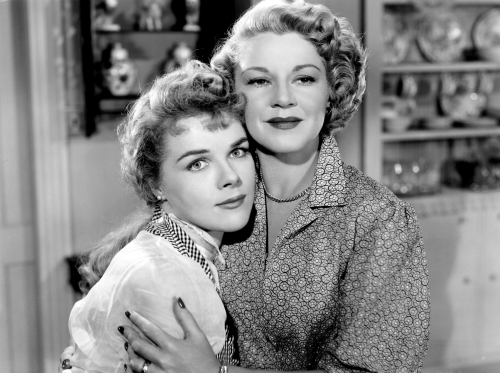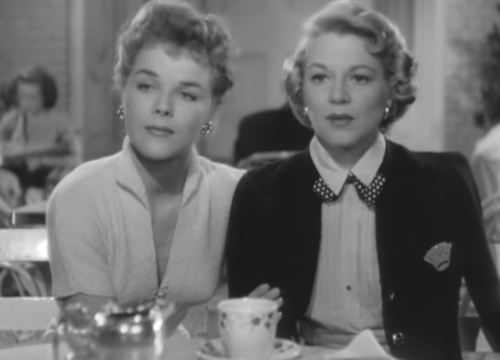Você provavelmente ouviu falar
das mães loucas pela fama (“overbearing stage mothers” – mulheres que obrigam
suas filhas a entrar para o mundo do entretenimento para que as carreiras das filhas
sejam a realização dos sonhos das mães. Estas mulheres também controlam as
carreiras das filhas de perto, afinal, tudo que suas filhas alcançam é visto
por elas como uma vitória pessoal. Mas este tipo de mulher também age nos
bastidores do mundo esportivo. Poderíamos chamá-las de “mães loucas
pelo troféu”? Talvez. Vão
importa o termo, temos um exemplo perfeito deste tipo abusivo de maternidade no
filme “Laços de Sangue” (1951), de Ida Lupino.
You probably have heard about
overbearing stage mothers – women who push their daughters to have a career in
entertainment as a way to fulfill their own dreams of stardom. These women also
control their daughters’ careers close, after all, everything their daughters
accomplish is felt by them as a personal victory. But this kind of women also
acts backstage in the sports world. Could we call them “overbearing court
mothers”? Maybe. No matter the term, we have a perfect example of this abusive
kind of motherhood in Ida Lupino’s “Hard, Fast and Beautiful” (1951).
Florence Farley (Sally Forrest) é
uma jovem com talento natural para jogar tênis. Ela treina rebatendo a bola
contra a porta da garagem de casa, e ela está novamente neste estranho treino
quando Gordon McKay (Robert Clarke) a vê. Gordon estudou na mesma escola que
ela, e trabalha em um clube local. Ele convida Florence para jogar tênis no
clube. Vendo o potencial dela, Clarence (Joseph Kearns), o gerente do clube, se
oferece para pagar para que ela participe de torneios de tênis pelo país.
Florence Farley (Sally Forrest) is a
young woman with a natural talent to play tennis. She practices by hitting the
ball in her garage door, and she’s doing just that when Gordon McKay (Robert
Clarke) sees her. Gordon went to the same high school as she, and works in a
local club. He invites Florence to go to the club and play. Seeing her
potential, Clarence (Joseph Kearns), the club manager, offers to pay for her to
participate in tennis tournaments around the country.
A mãe de Florence, Millie (Claire
Trevor), insiste em acompanhar a filha nos torneios. Millie está presente
quando Florence impressiona o olheiro Fletcher Locke (Carleton Young). Depois
de flertar com Millie, Fletcher embarca na missão de fazer de Florence a campeã
nacional das amadoras.
Florence’s mother, Millie (Claire
Trevor), insists on accompanying her daughter to the competitions. Millie is
there when Florence impresses the scout Fletcher Locke (Carleton Young). After
flirting with Millie, Fletcher dives in the mission of turning Florence into
the national amateur champion.
Meanwhile, Florence’s father, the
apathetic Will (Kenneth Patterson, a Fredric March lookalike), follows his
daughter’s career from home, far from all the excitement that thrills his wife.
As an amateur, Florence can’t receive money prizes, but she can receive little
gifts, like clothes, discounts in cars and free stays in hotels. She is like an
influencer, but from the tennis world – and Millie couldn’t be happier. But
things get complicated when Florence announces she’s marrying Gordon and
thinking about abandoning the sport.
É óbvio que conquistar a fama
através do esporte era o sonho de Millie, não de Florence. Isso fica claro
quando Florence vence sua primeira competição e, quando um repórter de rádio
pergunta como ela se sente após ganhar, ela diz para ele perguntar para a mãe
dela. Millie responde com perfeição, como uma porta-voz ensaiada.
It’s obvious that becoming notorious
through sport was Millie’s dream, not Florence’s. This is clear when Florence
wins her first competition and, when a radio reporter asks her how she feels
about winning, she tells him to ask her mother. Millie answers him perfectly,
as a media-trained spokesperson.
Claire Trevor é uma atriz
brilhante e subestimada. Inesquecível em filmes como “No Tempo das Diligências”
(1939) e “Paixões em Fúria” (1948), aqui ela é sedutora e manipuladora. Eu
entendo que, na juventude, Millie pode não ter tido as mesmas oportunidades de
Florence, mas nada justifica manipular alguém para que essa pessoa faça o que
você não foi capaz de fazer quando era jovem.
Claire Trevor is a brilliant and
underrated actress. Unforgettable in films like “Stagecoach” (1939) and “Key
Largo” (1948), here she is seductive and manipulating. I understand that,
growing up, Millie may not have had the same opportunities as Florence, but
nothing justifies manipulating someone to do what you couldn’t do earlier in
your life.
Sally Forrest fo um dos talentos
descobertos e cultivados por Ida Lupino enquanto diretora. Vinda da dança,
Sally foi protagonista de dois filmes anteriores de Lupino, “Mãe Solteira”
(1949) e “Quem Ama Não Teme” (1950). Com olhos brilhantes e uma expressão
ingênua, ela faz com que a transformação de Florence no decorrer do filme seja
ainda mais notável.
Sally Forrest was one of the talents
discovered and cultivated by Ida Lupino as a director. Coming from dance, Sally
was the lead of two previous Lupino-directed films, “Not Wanted” (1949) and
“Never Fear” (1950). With bright eyes and a naïve expression, she makes
Florence’s transformation later in the picture even more notable.
Um usuário do Letterboxd
mencionou que Lupino enquadra seus personagens como se eles estivessem em uma partida
de tênis metafórica. Isso é visto claramente quando a cerca e o grande girassol
servem como uma rede de tênis para separar Florence e Gordon. Florence e Millie
por vezes estão separadas por uma mesa, mas eu vejo a dinâmica delas mais como
um cabo de guerra, em especial quando Florence percebe que está sendo manipulada.
One reviewer on Letterboxd mentioned
that Lupino frames her characters as if they were in a metaphorical tennis
match. This happens clearly when the fence and the massive sunflower serve as a
tennis net to separate Florence and Gordon. Florence and Millie are sometimes
separated by a table, but I see their dynamics more as a tug of war, in special
when Florence realizes she’s being manipulated.
“Laços de Sangue” é um filme com
ritmo rápido e dinâmico. A ação acontece na casa da família Farley, no clube,
em diversos torneios aqui e ali, e a passagem de um cenário a outro é feita com
fluidez. Você ficará hipnotizado pelas partidas de tênis mesmo se nunca foi fã
do esporte. Sally Forrest foi treinada pela jogadora de tênis profissional
Eleanor Tennant.
“Hard, Fast and Beautiful” is a movie
with a quick, dynamic rhythm. The action happens in the Farley house, at the
club, in several tournaments here and there, and going from one to the other
happens with an easy flow. You’ll find yourself hypnotized by the tennis
matches even if you’ve never been a fan of the sport. Sally Forrest was coached
by professional tennis player Eleanor Tennant.
“Laços de Sangue” tem uma
característica irônica, se pensarmos no filme com uma mentalidade moderna: no
final, Florence tem de escolher entre uma mãe ciumenta que quer controlar a
carreira dela e um homem ciumento que quer que ela abandone a carreira. É
irônico pensar que este é o principal conflito em um filme feito pela única
mulher diretora da Hollywood dos anos 1950. Mas, uma vez que conhecemos o
conjunto da obra de Lupino, aprendemos que ele pode ser resumido em uma
palavra: resiliência. E, às vezes, é sendo resiliente que uma mulher consegue o
que quer – algo que Millie não aprendeu.
“Hard, Fast and Beautiful” has an ironic
twist once we think about it with modern lenses: ultimately, Florence needs to
choose between a jealous mother who wants to control her career and a jealous
man who wants her to abandon her career. It’s ironic to think that this is the
main conflict in a movie made by the only female director working in 1950s
Hollywood. But, once we get to know Lupino’s body of work, we learn that it can
be summarized in one word: resilience. And, sometimes, it’s by being resilient
that a woman gets what she wants – something Millie didn’t learn.
This is my contribution to The 110 Years
of Claire Trevor blogathon, hosted by Virginie and Crystal at The Wonderful World of Cinema and In the Good Old Days of Classic Hollywood.
To learn more about Ida Lupino’s career,
take a look at the Ida Lupino Files.









2 comments:
Loved reading your thoughts on this film Leticia! And how you describe the characters. I have not seen it yet (actually, I almost did yesterday) but I will make sure to add it to my list. Thanks so much for your participation to our blogathon!
Your well-expressed views on the film, its direction and performances, will influence many to watch this film when they may not have thought a tennis movie was their thing. Excellent!
Post a Comment